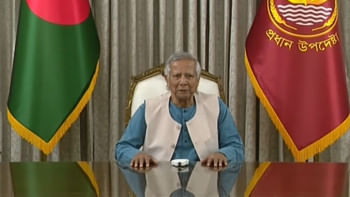The nightshift and its keepers
What keeps the night owls —norm defying nocturnal sapiens, and daredevils trading blows with insomnia— going as they burn the midnight oil to the ashes of wicks left of their candle like spirits at dawn?
Shift workers are generally prone to suffering from risks of type 2 diabetes, increased anxiety, and other health hazards. The reasons for why it's so difficult for us to alternate between night and daytime sleep seem to be embedded in our genetic codes, hypothesised to be from our Palaeolithic past — a throwback to when our ancestors only doodled on caves for fun. But despite all of this, in the context of Dhaka, many seem to actually prefer night shifts.
Shefayat Hossain, inspector of security from Shield Security, who has been working at North South University for the past 17 years, said that he prefers the night shifts due to the calm environment and the lower workload.
He adds that there are checks from management, and sleeping on the job leads to punishments and pay cuts. However, there is not much to keep them awake as it is against the rules to even drink tea or coffee from passing by tea sellers or street vendors!
The Senior Security Inspector from Independent University Bangladesh, who wished to remain anonymous, informed that the night shift lasts from 10PM to 6AM and all personnel are rotated every eight hours.
His work includes overseeing that everyone on duty is adequately alert. He mentioned that coffee and biscuits are enough to keep himself awake, and he finds that almost everyone on his team has developed a level of familiarity with the work and does not have much trouble staying awake.
Other members of security commented on a lack of snacks being available at the hours they have to stand vigil at. Cell phones and walks around the campus help clear out any drowsiness they usually feel, commented another member of security at the gate.
RJ Sarah Alam, from Radio Foorti, has to work from 11PM to 2AM when she hosts the show What the Foorti, and she finds the large number of responses at those hours from attentive listeners intriguing.
"At times, it's fun working alone, you get to focus on the work,'' said Sarah. She goes on to say if she had to pick between day shifts and working at night, "I usually set my preferences depending on the show. What I love about 'What the Foorti' is that it's a comedy show."
When asked if there's anything which helps her stay awake, she laughed and replied with, "When the job is fun, you don't really feel tired." On the downsides of working late, Sarah talked about how she does not like how her sleep cycle gets thrown out of whack. It leads to her sleeping well into the day and missing out on a lot of things.
Rashed Zaman, a former night crawler, is currently studying Mechanical Engineering at Monash University Malaysia. During his time as Assistant Marketing Manager at Techcloud Ltd., he had to make calls to potential clients between 9PM and 6PM.
He says that he had loved working at night primarily due to how it led to higher efficiency with minimal distraction all around.
"Another thing I loved was finishing up all work before sunrise and waking up to a day which is free to be conquered," said Rashed.
He would wake up at noon and start his day off with brunch, during those days. In order to keep his circadian rhythm in tempo, he had gotten double layered curtains for his room and instructed family members to keep noise away from him at the very least till 12:30PM.
Some of the things he found troublesome were the lack of recreational breaks and the thought of being stuck at the office with gates to the building being closed till the next morning, even during a potential emergency.
There was also a lack of support from the top of the chain during the night whereby certain problems had to await resolution till the light of day graced all.
By many accounts, the night itself transmutes established thought patterns into previously uncharted ways of thinking. With headlights chasing highway roads and solitary moon gazers adrift on night sailing winds, speakers playing Sinatra's "In the Wee Small Hours" or Tagore's "Amar Nishitho Raater Badol Dhara" in distant corners of Dhaka, there are those who have claimed the nights for themselves.
Trading sunshine for starlight, eerie quiet exchanged for blaring horns, stillness for motion, they forge dreams into reality at the darkest of hours.


 For all latest news, follow The Daily Star's Google News channel.
For all latest news, follow The Daily Star's Google News channel. 



Comments